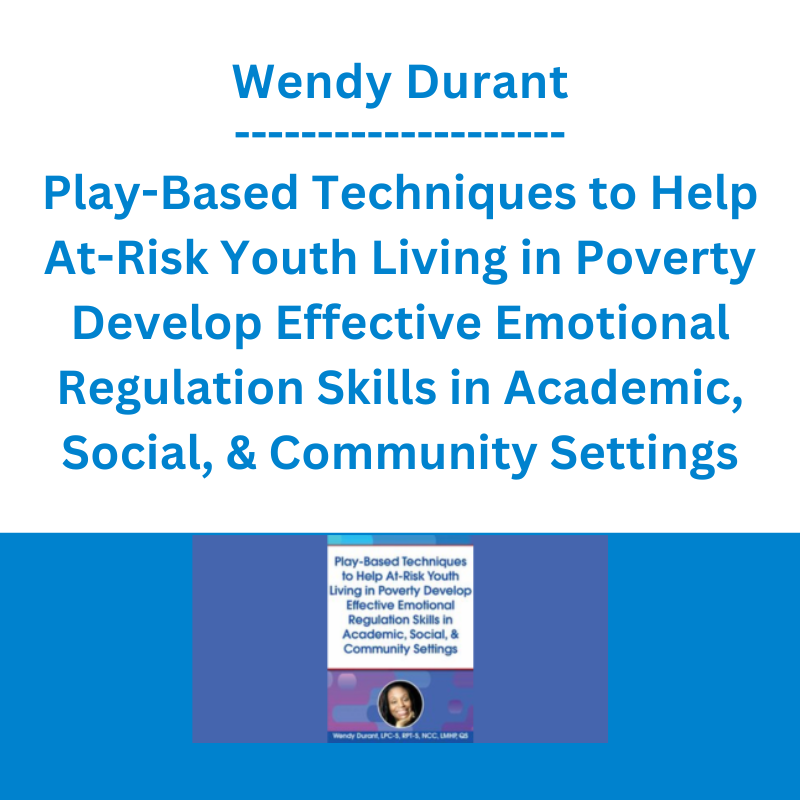*** Proof of Product ***
Exploring the Essential Features of “Wendy Durant – Play-Based Techniques to Help At-Risk Youth Living in Poverty Develop Effective Emotional Regulation Skills in Academic, Social, & Community Settings”
Speaker: Wendy Durant, LPC-S, RPT-S, NCC, LMHP, QS
Duration: 1 Hour 32 Minutes
Format: Audio and Video
Copyright: Aug 04, 2022
Media Type: Digital Seminar
Description:
The COVID-19 pandemic has resulted in a legacy of increased poverty and widening inequality. Children and youth are disproportionately impacted by poverty, making up 33% of all impoverished individuals. Living in low-income households has been associated with poor health, emotional dysregulation, and increased risk for mental health problems. After viewing this recording, you will learn play therapy clinical practices to support improved emotional regulation in academic, social, and community settings among children and youth living in poverty.
Speaker:
Wendy Durant, LPC-S, RPT-S, NCC, LMHP, QS, is a licensed professional counselor, LA Certified Teacher and Guidance Counselor who serves as CEO and executive director of DuraCARE Counseling & Consulting Services, an internationally accredited outpatient clinic that provides mental health, play therapy, and substance abuse services to children, adolescents, and adults.
Speaker Disclosures:
Financial: Wendy Durant is the CEO and lead therapist of DuraCARE Counseling & Consulting Services and has an employment relationship with CARF International. She receives royalties as a published author. Wendy Durant receives a speaking honorarium and recording royalties from PESI, Inc. She has no relevant financial relationships with ineligible organizations.
Non-financial: Wendy Durant is a member of the American Mental Health Counselors Association, the Association for Play Therapy, the Louisiana Association for Play Therapy, the Louisiana Counseling Association, and the Louisiana Mental Health Counselors Association.
Objectives:
- Attendees will articulate at least 3 implications poverty has on child and youth social, academic, and behavioral functioning.
- Attendees will verbalize one rationale why play therapy is an effective practice for addressing adverse outcomes among impoverished children and youth.
- Attendees will list at least 3 play therapy modalities and describe how they can implement them in their own practice setting.
Outline:
- Introduction
- A Framework for Understanding Child and Youth Poverty
-
- COVID-19 impact on child and youth poverty
- Alarming disparities of child poverty among ethnic minority groups
- Poverty’s impact on children and youth health, mental health, educational functioning
- Efficacy of Play Therapy in addressing adverse outcomes among impoverished children and youth
-
- Types of Play therapy modalities and interventions that promote improved emotional regulation among impoverished children and youth: Types of Play Therapy Interventions
-
-
- Child-Centered Play Therapy
- Adlerian Play Therapy
- Cognitive Behavioral Play Therapy
- Theraplay
-
-
- Play therapy interventions
- Conclusion
Target Audience:
- Counselors
- Educators
- Marriage & Family Therapists
- Nurses
- Psychologists
- Social Workers
- Speech-Language Pathologists
- Other Mental Health Professionals
Please see the full list of alternative group-buy courses available here: https://lunacourse.com/shop/









